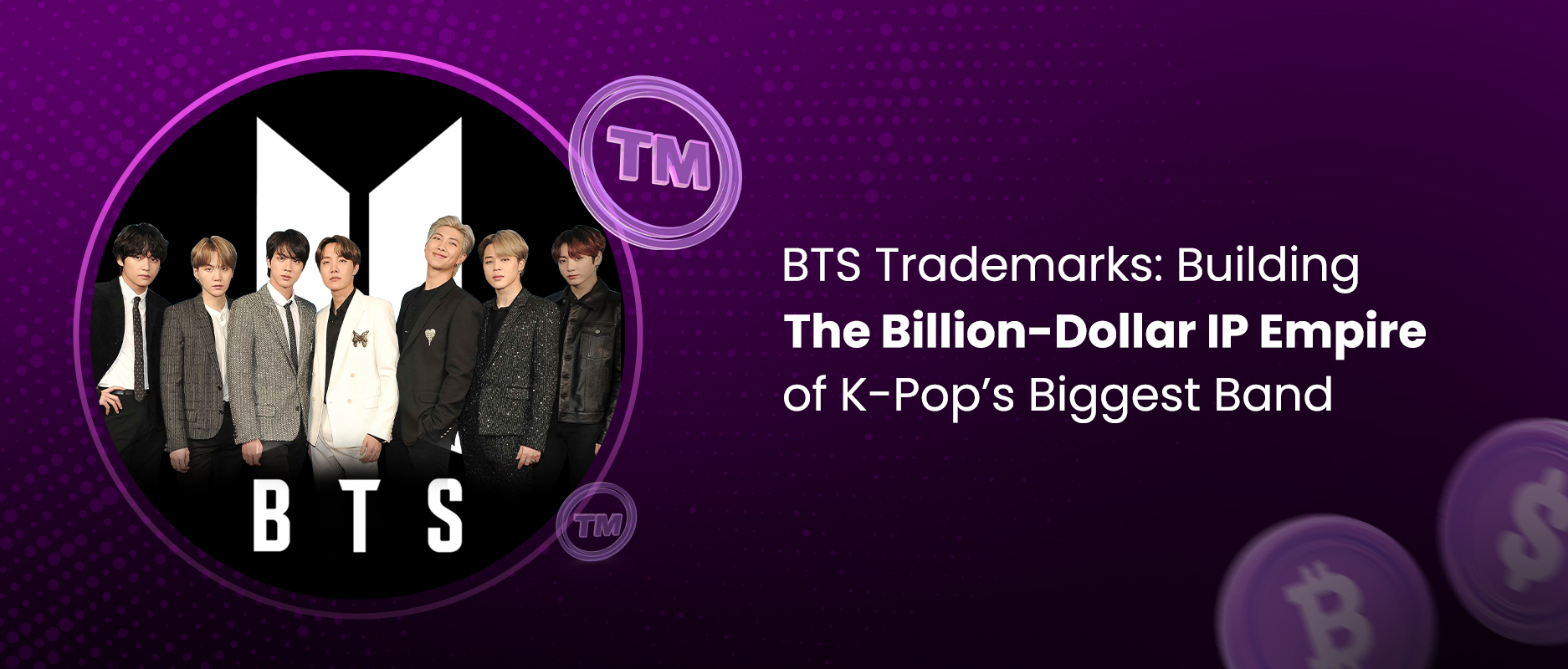BTS Trademarks: Building the Billion-Dollar IP Empire of K-Pop’s Biggest Band
October 16, 2025 By Dinesh ParmarWhen you think of the global juggernaut that is BTS, you likely recall the catchy songs, the magnetic performances and the ardent ARMY fandom. But behind the glittering shows lies a sophisticated blueprint of entertainment IP strategy, a behind-the-scenes engine that has helped turn this seven-member South Korean act into a multi-platform, multi-market brand. At the heart of that model are the carefully managed BTS trademarks and celebrity brand rights that turn music into merchandise, fandom into fandom-economy, and identity into intellectual property.
From Idol Group to Brand Ecosystem
At the core of the strategy is the recognition that BTS is more than just a musical group - it’s a brand, a lifestyle and a platform. Their agency, HYBE Corporation (formerly Big Hit Entertainment) has taken active steps to register the name “BTS” across multiple goods and services, from entertainment services and fan-club activities to apparel, cosmetics and virtual goods.
The label has also moved to control fan-brands: for example, “ARMY”: the name of BTS’s global fandom has been registered as a trademark in its own right.
One vivid example: In 2020, HYBE’s agency won a trademark-suit when a cosmetics firm attempted to register “B.T.S” on beauty goods and exploit the K-pop group’s popularity. The Intellectual Property Trial and Appeal Board of Korea found that the use created likelihood of confusion and cancelled the mark.
Another: The retail giant Shinsegae once claimed trademark rights over “BTS” for luxury clothing goods, but later renounced all such rights to HYBE after public and legal pressure.
Entertainment IP Strategy in Action
What makes BTS’s model compelling from an IP viewpoint is how they leverage multiple levers:
- Trademark Coverage: By filing “BTS” and associated marks (logo, stylized letters, fan-club names) in multiple classes and across regions. For example, one US registration lists “BTS” for live music concerts, video production, fan-club services, and online games.
- Celebrity Brand Rights: Each member increasingly becomes an individual brand; for example, Jungkook recently filed his own logo as a trademark.
- Fandom-economy: The name “ARMY” isn’t just a fan label - it’s a trademarked asset, enabling controlled merchandise, licensing and collaboration opportunities.
- Trans-media universe: BTS doesn’t just release songs, they built a fictional universe, integrated storytelling across albums, comics, games, physical goods and fan interaction platforms. This supports brand extensions and licensing.
International And Indian Contexts
Globally, the BTS brand model reflects how entertainment entities are evolving: musical acts becoming IP-driven brands. For example, the registration of “BTS” under EUIPO for goods such as posters, toys, online game services signals the breadth of brand monetisation.
In India, while BTS may not be headquartered here, the broader concept of celebrity brand rights is gaining traction. For instance, India’s sports and film stars are trademarking their nicknames and identities as seen in the article about names like “Captain Cool” (MS Dhoni) or “King Khan” (Shah Rukh Khan) being registered.
Thus, the lesson for Indian creatives and agencies: the entertainment IP strategy embodied by BTS is not restricted to K-pop alone - the same tactics apply in local contexts where strong fanbases, cross-media extension and brand licensing matter.
Why This Matters - And What’s At Stake
- Control: By owning the trademarks for “BTS”, HYBE prevents unauthorized third-parties from exploiting the name, image and fandom for profit. As the article notes: a court case ruled that image rights belong to the artists/agency, preventing “free-riding”.
- Revenue Diversification: Beyond concerts and albums, the brand extends into merchandise, games, virtual events, licensing, collaborations. The trademark portfolio creates legal foundations for these varied streams.
- Global expansion & protection: The more you expand globally, the more you expose your brand to infringement risk. Having registered marks across jurisdictions gives legal muscle.
- Legacy & longevity: By treating BTS as a brand-ecosystem rather than just a group of performers, the model is built for long-term value, even beyond active performing years.
Key Lessons For Brands & Creators
- View your act not just as an artistic unit but as a brand with multiple revenue nodes.
- Register your key identifiers (name, logos, fan-community names) across classes and key markets.
- Monitor for unauthorized use - the Shinsegae/ cosmetics cases show how third-parties may try to exploit popularity.
- Leverage the fandom: treat community and identity (fan-club names) as brand assets.
- Think trans-media: connect music to merchandise, digital content, games, royalties.
- In local contexts (like India), creatives and entertainment companies can adopt similar approaches to celebrity brand rights for Indian stars.
FAQs
Q1: What exactly are “BTS trademarks”?
They refer to registered (and pending) trademark filings by BTS’s management to protect names such as “BTS”, “ARMY”, logos, stylised wordmarks, and other brand elements. These registrations cover goods and services like music concerts, fan-clubs, apparel, games, toys, books and more. For example, the mark “BTS” in the US covers entertainment services and online games.
Q2: What is entertainment IP strategy?
It’s the deliberate approach to turn creative content (music, performance, fandom) into protected intellectual property (trademarks, copyrights, and sometimes patents) and then monetise across media, merchandise, licensing and platform revenue. BTS’s universe (albums + games + merchandise) is a textbook example.
Q3: How do celebrity brand rights factor in?
Celebrities and groups increasingly realise that their name, image, catch-phrases, logos and fan-community identifiers are commercial assets. Securing rights (via trademarks, image rights) prevents unauthorized use and builds brand control as with BTS or Indian examples like MS Dhoni’s “Captain Cool”.
Q4: If someone else registers “BTS” in my country, can BTS stop them?
Yes! and they’ve done so. For example, HYBE challenged a cosmetics brand using “BTS” in Korea and won cancellation of the registrations. But monitoring each country is vital, and local trademark laws and fairness doctrines may apply (for example, a phrase coined by a member might not be registrable).
Q5: What’s the take-away for Indian creators or brands?
Don’t just create music or content - treat your branding, your name, your community and your good-will as assets. Register key names, logos, phrases, partner with licensing bodies, and think beyond core content. The global model of BTS shows that this works when done strategically and early.
Conclusion
In the high-velocity world of K-pop and global entertainment, BTS did more than break records, they built a brand architecture of guard-rails around their creativity, name and fandom. Their tightly managed trademarks, their trans-media expansions and their brand-centric mindset illustrate the power of an entertainment IP strategy done right. Whether you’re a musician, a creator, a brand manager or a marketer, the story of BTS offers a blueprint: build your identity, protect it, monetize it, and don’t just perform - create a lasting brand ecosystem.






